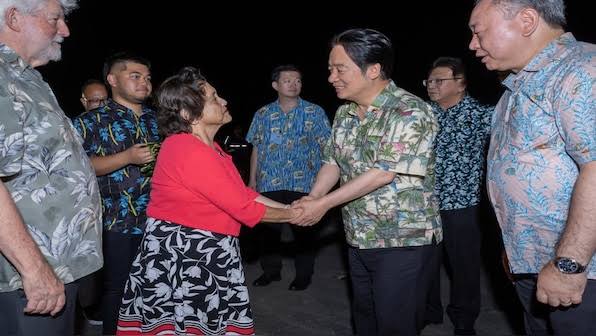Taiwan’s President Lai Ching-te Sparks Global Buzz: Meets U.S. Leaders in Guam Amid High-Stakes China Tensions
TAIPEI, Taiwan — Taiwanese President Lai Ching-te continued to strengthen ties with the United States during his visit to Guam on Thursday, engaging in discussions with prominent U.S. congressional leaders. This marked his second stop in the U.S. as part of a Pacific Island tour aimed at fostering security and economic cooperation.
In a post on social media platform X, Lai shared details of his conversations with Republican House Speaker Mike Johnson, House Democratic Leader Hakeem Jeffries, and Senator Roger Wicker, the ranking Republican on the Senate Armed Services Committee. “#Taiwan is grateful for the bipartisan #US Congressional support as we advance peace & prosperity in the Indo-Pacific,” Lai wrote, underscoring Taiwan’s commitment to maintaining stability in the region.
Lai’s visit drew sharp criticism from Beijing, which views Taiwan as a breakaway province and opposes any official interaction between Taiwan and the U.S. Chinese Foreign Ministry spokesperson Lin Jian reiterated that “the Taiwan issue is at the core of China’s core interests and the first red line that must not be crossed in China-U.S. relations.”
During his stop in Guam, Lai met with the governor and addressed the legislature, emphasizing the shared democratic values and strategic significance of both Taiwan and Guam in maintaining Indo-Pacific security. He highlighted their role within the “first island chain,” a critical geopolitical line that includes Japan, Taiwan, and the Philippines.
“Let us together become the crucial force in defending freedom and democracy in the first island chain,” Lai urged.
Lai’s visit to Guam followed earlier stops in Hawaii, the Marshall Islands, and Tuvalu. He is now in Palau, the final destination of his tour. The trip underscores Taiwan’s efforts to bolster international alliances amid ongoing tensions with China, which continues to exert pressure on nations that engage diplomatically with the self-governed island.
The U.S., Taiwan’s key arms supplier, maintains a strong military presence in the Indo-Pacific through bases in Guam and elsewhere, further fueling China’s objections to Taiwan-U.S. relations. Despite Beijing’s protests, Lai’s meetings signal the growing bipartisan support within the U.S. for Taiwan’s efforts to safeguard its sovereignty and regional peace.


Comments are closed, but trackbacks and pingbacks are open.